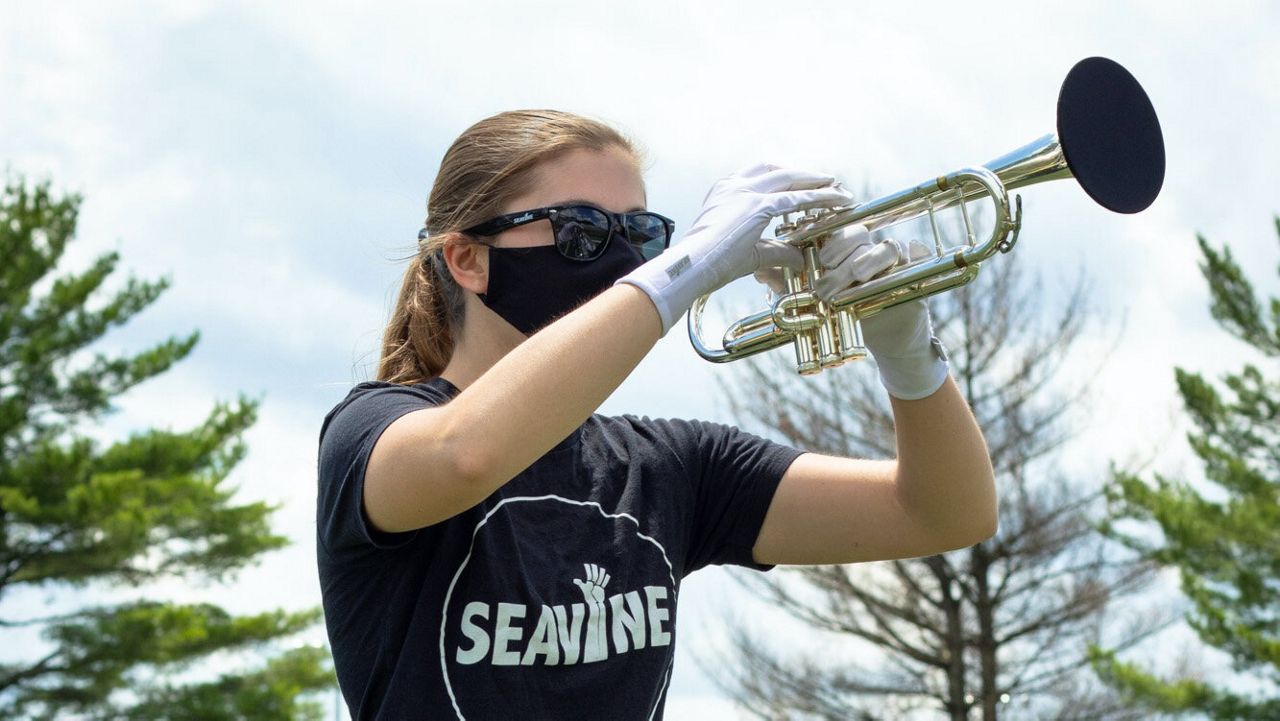LOS ANGELES — For Chelsea Levine, being part of a marching band has been a big part of her life.
It was at band where she met her matron of honor and several other close friends. She teaches cymbals to students and created a company that provides equipment to high school marching bands nationwide, including many in the Greater Los Angeles area.
“I’ve made a life of it,” Levine said of her band experience.
But the coronavirus this year has taken away that experience of learning, teamwork, and being part of an ensemble for many music and band members nationwide, including California. So Levine wanted to do something about it.
With high school band and choir on hold in many states, Levine’s company that equips Southern California schools with music equipment has come up with its own personal protective equipment to get music and band performers back out practicing in person.
Using recommendations from a new study conducted by a coalition of music organizations, Levine has created a face mask with a mouthpiece opening and two types of covers for woodwind and brass instruments.
“When the study came out, we came up with our own type of safety products,” Levine said. “It was very much like home [economics]. We wanted to see if this will help prevent the spread of aerosols and it did.”
Under the California Department of Public Health’s guidance for the upcoming school year, band and choir performances indoor and outdoors are prohibited as a measure to prevent the spread of the coronavirus.
“Activities where there is increased likelihood for transmission from contaminated exhaled droplets such as band and choir practice and performances are not permitted,” according to the state. “Activities that involve singing must only take place outdoors.”
The guidance further stated outdoor and indoor events “that require close contact or that would promote congregating are not permitted at this time.”
The guidance, last updated on Aug. 3, has been a big blow to the state's band performers and educators in the state, said California Music Educators Association President Armalyn De La O. De La O also serves as a music educator based in San Bernardino.
Music educators were concerned that the state’s guidance might completely stop schools from allowing band, music, and choir programs in the state during the coronavirus pandemic.
“When you make a blanket statement like what they did, there is a misunderstanding from the [school] administrations that we can’t have band and choir,” De La O said, adding that whenever schools face some type of budgetary crisis, arts and music programs usually suffer first.
De La O said schools should continue their music program either in a safe virtual setting or, when it is safe to do so, outdoors.
De La O said she wants the state to know that practicing music in person is still safe as long as students and educators take necessary precautions.
A study funded and done by a coalition of music organizations including NAMM, the National Federation of State High School Associations, College Band Directors Association and many others, confirmed that in-person music and band performances whether indoors or outdoors is safe as long they follow certain safety measures.
The Performing Arts Aerosol study, which focused on the distribution of respiratory aerosols while playing an instrument, stated that students spaced at least six feet apart and wearing masks could decrease potential exposure to respiratory or aerosol droplets. The study did not use a live virus or infected participant. The study is still ongoing.
But the study did suggest that masks with slits or mouth openings and bell covers made of nylon “all reduced particle concentrations.”
“Bell covers are highly recommended as ‘masks’ for the instruments,” the study states. “Bell covers can be made of multi-layered high denier nylon material and provide a barrier for aerosols.”
When Levine saw the study, she immediately acted on it. So have many others.
Levine said the face masks her company produces has an overlapping feature that allows the user to play their instrument. She also makes a bell cover for woodwind and brass instruments that comes in different shapes and sizes.
She said the masks and coverings do not muff the sound.
“To the listener, they might not notice the difference,” she said. “But for the wearer, it just feels different. The vibration is different.”
However, the goal is to reduce the spread of respiratory droplets and to keep students safe and back to playing in person, especially in California. Other schools in states that have reopened have made face masks and instrument covers mandatory for band and music students. Some local school districts have also adopted their own safety protocols with band and choir.
These new coverings can help get students back to practicing in person together and being part of a team again, she said.
"Something is better than nothing," she said.



